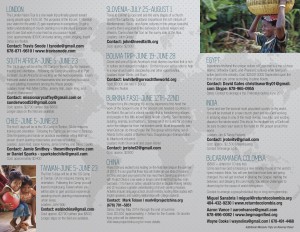I remember my first mission trip. Our church went to Mexico. I was reluctant to go but was invited so I went. The trip impacted my life! That mission trip did something in me. My eyes were opened to a need beyond my own city and country! I remember the Sunday night service after we returned home. People gave testimonies to how the trip impacted their lives. It was very exciting to the church. It burned in the hearts of those who went and the others who were not able to go saw it in them!
I firmly believe that a mission trip will do something amazing in a church. I believe a youth group will be challenged by it. God will use a mission trip to open eyes and hearts to the need of the Gospel around the world. But mission trips are not easy to organize. Where do we go? Who do we contact? When do we go? How much will it cost? All of these are great questions? But it doesn’t have to be that hard. I have included information in this post about upcoming “Vision Tours” for 2017 (Vision Tours are mission trips). There are options for a mission trip for your church to different places around the world (Argentina is not included as an option and it is something we will be working to provide in the years to come. The dates are notated on the pamphlet as well as cost and contact information. Any of these options would be an incredible opportunity for you and the church! Click here for a PDF version of this pamphlet. 2017 can be the year God uses a mission trip that makes an impact you will never forget!

